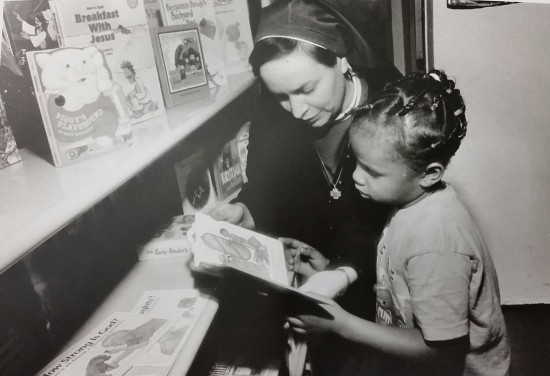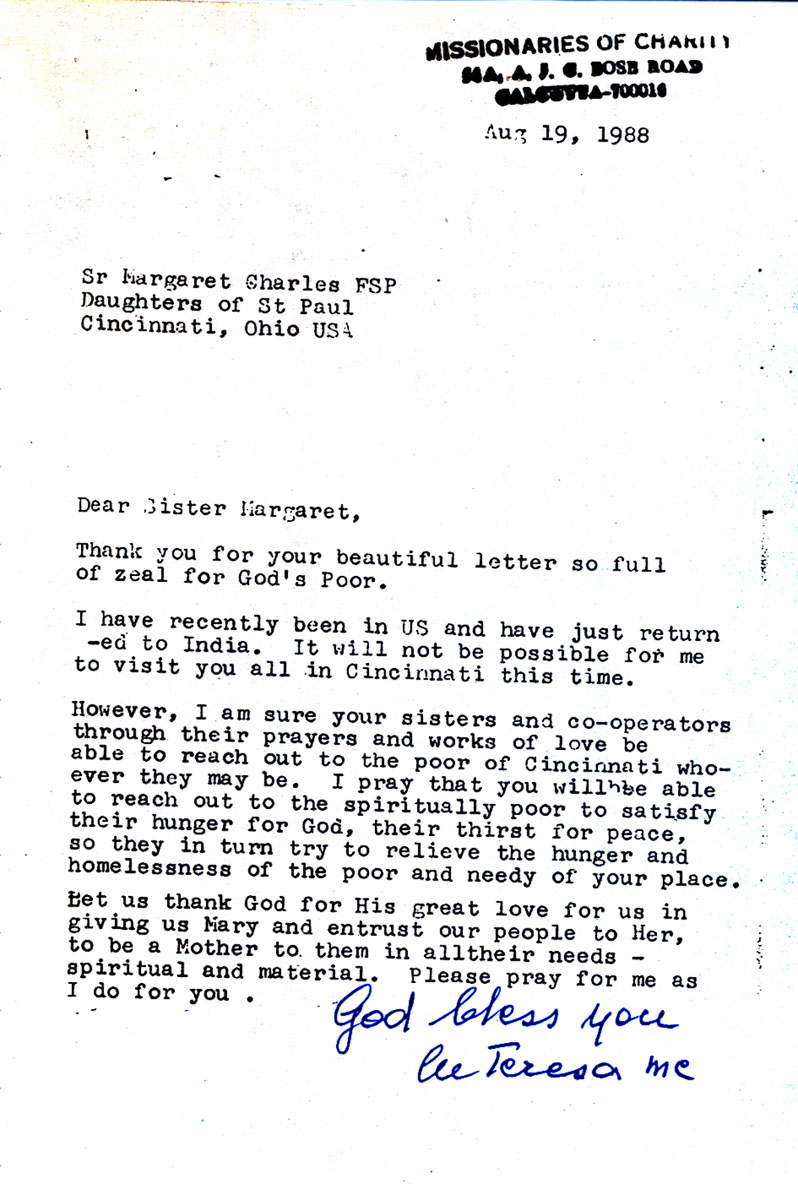“Both the believer and the unbeliever share, each in their own way, doubt and belief.” Joseph Ratzinger, Introduction to Christianity
 The author with Mother Teresa in Kentucky, 1988. All rights reserved.
The author with Mother Teresa in Kentucky, 1988. All rights reserved.
Back in 1995 while eating lunch above our Pauline Book & Media center I read the third in a series of articles in the Chicago Tribune titled “Saving our Children.” This series described how children in the inner city were killed by stray bullets in gang wars. Suddenly with a bolt of awareness I realized that we could be with these children through our mission. I had met Mother Teresa six years earlier and received a letter from her in which she addressed the mission of evangelization. This had a lot to do with my response. In retrospect, even my sensitivity to these articles was because of her influence.
[Tweet "The poverty @kerrygma hoped to help alleviate negated dreams for inner-city children."]
The poverty I hoped to help alleviate with our Pauline mission was the poverty that negated dreams for these children. It was the poverty that Blessed James Alberione wrote about: “A good part of today’s world suffers from a shortage of bread. There is a far greater shortage of the spiritual bread brought by Jesus who said, ‘I am the Bread of Life.’" Mother Teresa wrote, “Into each of our lives Jesus comes as the bread of life to be eaten, to be consumed by us. Then he comes as the hungry one, the other, hoping to be fed with the bread of our life, our hearts loving, and our hands serving.”
 The author in 1996 helping a child pick out a book during the opening of an inner city reading room in Chicago's projects. All rights reserved.
The author in 1996 helping a child pick out a book during the opening of an inner city reading room in Chicago's projects. All rights reserved.
In our technological age, Mother’s mission answers the question asked by Pope Benedict XVI, “What will happen when we can no longer find the divine mystery in the other but only what makes them useful?” She modeled presence as a reflection of the promise of God with us in every circumstance of our life – regardless of what we can make or produce. Not only did she model the unconditional love of God, she also persevered in being present while not feeling the presence of God in her own life. David Scott wrote,
“In Mother Teresa's dark night, we can hear all the anguish of her century — the desolation of the poor, the cries of the unwanted children, of the atheist, of all those who can't murmur a prayer or feel to love anymore. It was as if in some way she was bearing their sufferings.”
 In her letter to me she wrote: “Reach out to the spiritually poor to satisfy their hunger for God, their thirst for peace, so they in turn try to relive the hunger and homelessness of the poor and needy of your place.” It is not in our fullness but in our hunger and thirst that we revive the belief of others, as it was for Saint Teresa of Kolkata.
In her letter to me she wrote: “Reach out to the spiritually poor to satisfy their hunger for God, their thirst for peace, so they in turn try to relive the hunger and homelessness of the poor and needy of your place.” It is not in our fullness but in our hunger and thirst that we revive the belief of others, as it was for Saint Teresa of Kolkata.
Copyright 2016 Sr. Margaret Kerry, fsp
About the Author

Sr. Margaret Kerry, fsp
A Daughter of St. Paul for 40 years Sr. Margaret continues to pursue new ways to proclaim the Gospel: sharing the Pauline Charism with the laity, writing books (St. Anthony of Padua: Fire & Light; Strength in Darkness: John of the Cross; Prayers for the New Evangelization), & through direct evangelization. She is available for workshops on the Vocation & Mission of the Laity, Media Literacy, and The New Evangelization. mkerry@paulinemedia.com


.png?width=1806&height=731&name=CatholicMom_hcfm_logo1_pos_871c_2728c%20(002).png)
Comments